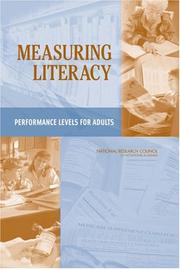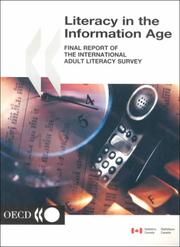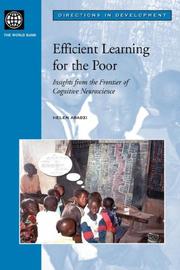| Listing 1 - 10 of 48 | << page >> |
Sort by
|
Book
ISBN: 9264273352 9264273174 Year: 2017 Publisher: Paris : OECD,
Abstract | Keywords | Export | Availability | Bookmark
 Loading...
Loading...Choose an application
- Reference Manager
- EndNote
- RefWorks (Direct export to RefWorks)
Functional literacy. --- Adult literacy --- Functional illiteracy --- Life skills --- Literacy
Book
ISBN: 9264799001 9264604669 9264811079 Year: 2019 Publisher: Paris : OECD,
Abstract | Keywords | Export | Availability | Bookmark
 Loading...
Loading...Choose an application
- Reference Manager
- EndNote
- RefWorks (Direct export to RefWorks)
Functional literacy. --- Adult literacy --- Functional illiteracy --- Life skills --- Literacy
Book
ISBN: 9264972102 9264592725 Year: 2019 Publisher: Paris : OECD,
Abstract | Keywords | Export | Availability | Bookmark
 Loading...
Loading...Choose an application
- Reference Manager
- EndNote
- RefWorks (Direct export to RefWorks)
Functional literacy. --- Adult literacy --- Functional illiteracy --- Life skills --- Literacy
Book
ISBN: 9282605620 Year: 1991 Volume: vol *450
Abstract | Keywords | Export | Availability | Bookmark
 Loading...
Loading...Choose an application
- Reference Manager
- EndNote
- RefWorks (Direct export to RefWorks)
Labour market --- European Union --- Literacy --- Alphabétisation --- Functional literacy --- Congresses. --- -Adult literacy --- Functional illiteracy --- Life skills --- Congresses --- -Congresses --- Alphabétisation --- Adult literacy

ISBN: 1280286407 9786610286409 0309550157 9780309550154 9781280286407 0309096529 9780309096522 661028640X 0309165180 9780309165181 Year: 2005 Publisher: Washington, DC : National Academies Press,
Abstract | Keywords | Export | Availability | Bookmark
 Loading...
Loading...Choose an application
- Reference Manager
- EndNote
- RefWorks (Direct export to RefWorks)
Functional literacy --- Literacy. --- Illiteracy --- Education --- General education --- Adult literacy --- Functional illiteracy --- Life skills --- Literacy --- Evaluation.
Book
ISBN: 9264091262 9264091254 Year: 2011 Publisher: Paris : OECD Publishing,
Abstract | Keywords | Export | Availability | Bookmark
 Loading...
Loading...Choose an application
- Reference Manager
- EndNote
- RefWorks (Direct export to RefWorks)
Literacy for Life is the second report from the Adult Literacy and Life Skills Survey. It presents additional results on the nature and magnitude of the literacy gaps faced by OECD countries and how these gaps have evolved over the medium term. It offers new insights into the factors that influence the formation of adult skills in various settings – at home and at work – for the eleven countries participating in the first and last round of data collection between 2003 and 2008. The study offers comparative evidence on the impact of various factors on the supply of skill. The study offers a special focus on numeracy skills and problem solving skills. It explores the relationships between numeracy and key socio-demographic factors as well as labour market outcomes and earnings. It highlights the importance of problem solving skills by defining this foundational skill and by exploring its determinants as well as its relative role in influencing important labour market outcomes. The report offers also an analysis of performance across multiple skill domains. It investigates the skill profiles of various population groups defined in terms of the demographic and socioeconomic characteristics of those who score at levels deemed to be low in one or more skill domains and explores the resulting consequences. The report concludes by investigating the issue of skill mismatch in the labour market and its relationship to adult learning. The extent and distribution of mismatch between the day-to-day literacy related requirements of workers and the literacy skills they have obtained is an important issue that is being explored in this study.
Social Issues/Migration/Health --- Education --- Functional literacy --- Numeracy --- Problem solving --- Adult Literacy and Life Skills Survey. --- Adult literacy --- Functional illiteracy --- Methodology --- Psychology --- Decision making --- Executive functions (Neuropsychology) --- Mathematical ability --- Mathematics --- Statistics --- Life skills --- Literacy

ISBN: 1280030755 9786610030750 9264181768 9264176543 Year: 2000 Publisher: Paris : OECD Publishing,
Abstract | Keywords | Export | Availability | Bookmark
 Loading...
Loading...Choose an application
- Reference Manager
- EndNote
- RefWorks (Direct export to RefWorks)
Literacy in the Information Age, the final report from the International Adult Literacy Survey, presents evidence on the nature and magnitude of the literacy gaps faced by OECD countries. It offers new insights into the factors that influence the development of adult skills in various settings - at home, at work and across the 20 countries for which comparable household assessment results are included. Findings point to large differences in the average level and population distribution of literacy skills both within and between countries. Low literacy skills are evident among all adult groups in significant - albeit varying - proportions. Literacy proficiency varies considerably according to home background factors and educational attainment in most of the countries surveyed. However, the relationship between literacy skills and educational attainment is complex. Many adults have managed to attain high levels of literacy proficiency despite a low level of education; conversely, some have low literacy skills despite a high level of education. These differences matter both economically and socially: literacy affects, inter alia, labour quality and flexibility, employment, training opportunities, income from work and wider participation in civic society. Improving the literacy skills of the population remains a large challenge for policy makers. The results suggest that high-quality foundation learning in schools is important but insufficient as a sole means to that end. Policies directed at the workplace and family settings are also needed. The employers’ role in promoting and rewarding literacy skills is particularly important for skills development.
Content area reading. --- Education. --- Functional literacy. --- Literacy. --- Functional literacy --- Literacy --- Education --- Social Sciences --- Education, Special Topics --- Illiteracy --- Adult literacy --- Functional illiteracy --- General education --- Life skills --- Economic aspects --- Government policy. --- International Adult Literacy Survey. --- IALS
Book
ISBN: 0872071227 Year: 1994 Publisher: Newark International reading association
Abstract | Keywords | Export | Availability | Bookmark
 Loading...
Loading...Choose an application
- Reference Manager
- EndNote
- RefWorks (Direct export to RefWorks)
Adult education --- Functional literacy --- Adult literacy --- Functional illiteracy --- Life skills --- Literacy --- Adults, Education of --- Education of adults --- Education --- Continuing education --- Open learning
Book
ISBN: 9789264281110 9789264284203 9789264297364 Year: 2017 Publisher: Paris, [France] : OECD,
Abstract | Keywords | Export | Availability | Bookmark
 Loading...
Loading...Choose an application
- Reference Manager
- EndNote
- RefWorks (Direct export to RefWorks)
Functional literacy --- Functional literacy. --- Literacy. --- Adult education. --- Adults, Education of --- Education of adults --- Education --- Continuing education --- Open learning --- Illiteracy --- General education --- Adult literacy --- Functional illiteracy --- Life skills --- Literacy

ISBN: 0821366882 0821366890 9780821366882 9786610503575 1280503572 Year: 2006 Publisher: Washington, DC : World Bank,
Abstract | Keywords | Export | Availability | Bookmark
 Loading...
Loading...Choose an application
- Reference Manager
- EndNote
- RefWorks (Direct export to RefWorks)
Large-scale efforts have been made since the 1990's to ensure that all children of the world go to school. But mere enrollment is not sufficient, students must become fluent in reading and calculation by the end of grade 2. Fluency is needed to process large amounts of text quickly and use the information for decisions that may ultimately reduce poverty. State-of-the-art brain imaging and cognitive psychology research can help formulate effective policies for improving the basic skills of low-income students. This book integrates research into applications that extend from preschool brain development
Teaching --- Developing countries --- Literacy --- Functional literacy --- Learning --- Cognitive neuroscience --- Cognitive neuropsychology --- Cognitive science --- Neuropsychology --- Adult literacy --- Functional illiteracy --- Life skills --- Physiological aspects. --- Social aspects.
| Listing 1 - 10 of 48 | << page >> |
Sort by
|

 Search
Search Feedback
Feedback About
About Help
Help News
News